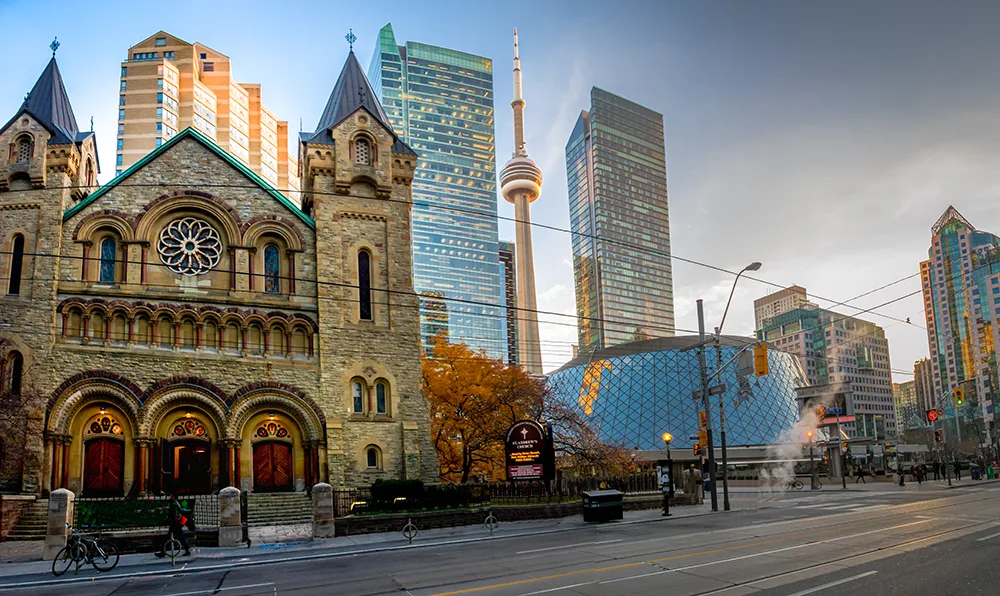This article provides a comprehensive overview of accommodation conditions for students in Toronto, Canada, focusing on affordability and various housing options. It begins by contextualizing Canada's economic standards and cost of living, emphasizing the comparative affordability of housing in Canadian cities like Toronto and Montreal. The text highlights the expense of life in Toronto compared to other cities, stressing the city's status as one of the most expensive places to live in Canada due to the scarcity of affordable housing.

Before deciding on moving to somewhere else, everyone wants to know about certain economical aspects of that place. We gathered these aspects for you to consider in this article of ours.
First, let’s look at the general economic standards of Canada. Family of four’s estimated monthly costs are 4,021C$ without rent. A single person’s estimated monthly costs are 1,122C$ without rent. Cost of living in Canada is, on average, 3.06% higher than in United States. Rent in Canada is, on average, 15.92% lower than in United States.
In terms of housing, average cost of shared accommodations in Canada is $250 - $700 CDN monthly. Average cost of a suite or apartment is $400 - $1,500 CDN monthly.
Rental costs vary across cities and across Canada. They usually cost less outside large cities. You will likely pay at least $350 a month to rent a room. You can pay at least $2,000 a month to rent a larger apartment or a large house.
Toronto and Vancouver are the most expensive cities to live at and with the shortage of affordable housing in Toronto, costs are the highest there and still continue to rise.
Being usually around 73m² to 132m², compared to other big cities like New York and London, Canadian cities like Montreal and Toronto are much more affordable. On average, students should expect to spend somewhere between $675-$875 CAD a month before rent.
For those who will study in Canada or apply to universities in the country should know about the accommodation options.
Firstly, students who will stay in the country for a short time can choose hotels and hostels.
If you are thinking of studying in Canada for a short time, hotels can be one of the options. The point you need to pay attention is weekly, 15 days or monthly reservations for the hotels you prefer should be scheduled 2-3 months in advance and not make between the busy August-May.
In terms of accommodation prices in Canada, hostels preferred by short-term off-campus students range from a minimum of $25 CND. In hostels, which are not very comfortable compared to hotels, areas such as toilets, bathrooms and kitchens are shared, while mostly rooms consist of beds for 3-4 people. Especially, you will have the opportunity to make friends with students of different nationalities that you will meet while cooking in common kitchens, and then rent apartments for 2-3 people together if you use your hostel temporarily.
Accommodation in Canada is divided as on-campus and off-campus accommodations for international students. It is beneficial to determine the most suitable accommodation options for you according to your lifestyle, habits, and budget and to do research before the university application dates.
Homestay accommodation, which is the most preferred type of accommodation for most of the students who will study abroad, is provided by the school. The best part of these accommodations, where you can improve your foreign language with the families you will live with, is that you can adapt more easily to life in Canada. As you continue your student life in a safe and organized environment, you can also ask your family for breakfast and dinner. For these services, which are sometimes included in the accommodation fee, it is useful to talk to your school in Canada. Internet access, TV and cleaning are provided by the family in single and specially furnished rooms. Homestays are often preferred by international students, with prices between $ 700 and $ 900 CND.
If you are considering a long-term student life in Canada, dormitories in campus or close to the campus are the best options. Basic needs such as bathroom, kitchen and toilet are shared in single or double rooms. In the dormitories that are separate for girls and boys, costs such as internet, electricity and water are included in your monthly fee. You can make friends in the dormitories where you will have a library, computer room and common study areas, as well as get help from each other about lessons and homework.
While in a city like Toronto pays an average of 9,000 to 13,000 Canadian dollars annually, prices in universities in cities like Montreal or Quebec will be slightly higher. It is useful to make the right choice by consulting the universities about accommodations in Canada. For the September period, you should apply in May at the latest, beginning September in the beginning of January.
Students starting their education life in Canada mostly consider renting an apartment in the second or third years of their education. Because it takes a long time to get used to the country and the city, to absorb its culture and traditions, and to adjust the budget. Moreover, if the flat prices are high, finding a roommate for yourself, getting scholarship support and benefiting from part-time job opportunities will also affect the proximity of the flat you will rent to the university and the city. Although rental fees are high in modern and large cities such as Toronto, Montreal, and Vancouver, it is more affordable than cities such as New York and Sydney. We recommend that you do research while studying in the country on rents starting from an average of $1,000 CND.
You can use local newspapers and websites for listings of rental houses and flats. It also works well for school postings. Because students from the previous years or the same period may be looking for a rental apartment just like you.